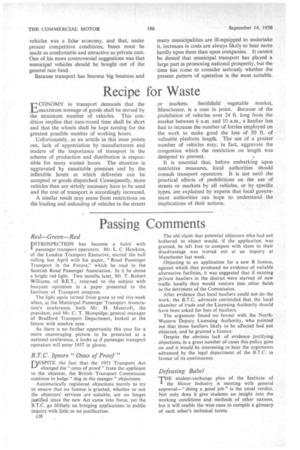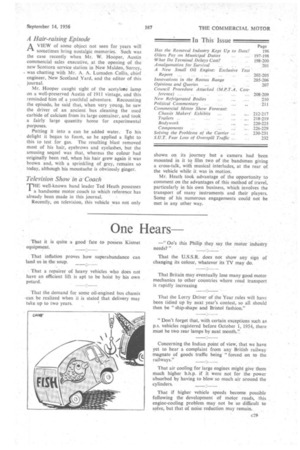Passing Comments
Page 78

Page 79

If you've noticed an error in this article please click here to report it so we can fix it.
Red—Green—Red
INTROSPECTION has become a habit with I passenger transport operators. Mr. L. C. Hawkins, of the London Transport Executive, started the ball rolling last April with his paper, "Road Passenger Transport in the Future," which he read to the Scottish Road Passenger Association. In it he shone a bright red light. Two months later, Mr. T. Robert Williams, of B.E.T., returned to the subject with buoyant optimism in a paper presented to the Institute of Transport congress.
The light again turned from green to red this week when, at the Municipal Passenger Transport Association's conference, both Mr. H. Muscroft, the president, and Mr. C. T. Humpidge, general manager of Bradford Transport Department, looked at the future with sombre eyes.
As there is no further opportunity this year for a more encouraging picture to be presented at a national conference, it looks as if passenger transport operators will enter 1957 in gloom.
B.T.C. Ignore "Onus of Proof"
EESPITE the fact that. the 1953 Transport Act ' changed the "onus of proof" from the applicant to the objector, the British Transport Commission continue to lodge "dog in the manger" objections.
Automatically registered objections merely to try to ensure that no licence is granted, whether or not the objectors' services are . suitable, are no longer justified since the new Act came into force, yet the B.T.C. go blithely on bringing applications to public inquiry with little or no justification.
c28
The old claim that potential objectors who had not bothered to object would, if the application was granted, be left free to compete with them to their disadvantage was trotted out at an inquiry at Manchester last week.
Objecting to an application for a new B licence, against which they produced no evidence of suitable alternative facilities, it was suggested that if existing private hauliers in the district were starved of new traffic locally they would venture into other fields to the detriment of the Commission.
After evidence that local hauliers could not do the work, the B.T.C. advocate contended that the local chamber of trade and the Licensing Authority should have been asked for lists of hauliers.
The argument found no favour with the NorthWestern Deputy Licensing Authority, who pointed out that those hauliers likely to be affected had not objected, and he granted alicence.
Despite the obvious lack of evidence justifying objections, in a great number of cases this policy goes on and it would be interesting to hear the arguments advanced, by the legal department of the B.T.C, in favour of its continuance.
Defeating Babel
THE student-exchange plan of the Institute of the Motor Industry is meeting with general approval—" doing a good job" is the usual verdict. Not only does it give students an insight into the working conditions and methods of other nations, but it will enable the wise ones to compile a glossary of each other's technical terms.
A Hair-raising Episode
A VIEW of some object not seen for years will Sometimes bring nostalgic memories. Such was the case recently when Mr. W. Hooper, Austin commercial -sales executive, at the opening of the new Scottorn service station in New Malden, Surrey, was chatting with Mr. A. A. Lumsden Collis, chief engineer, New Scotland Yard, and the editor of this journal. Mr. Hooper caught sight of the acetyleate lamp on a well-preserved Austin of 1911 vintage, and this reminded him of a youthful adventure. Recounting the episode, he said that, When very young, he saw the driver of an ancient bus cleaning the used carbide of calcium from its large container, and took a fairly large quantity home for experimental purposes.
Putting it into a can he added water. To his delight it began to foam, so he applied a light to this to test for gas. The resulting blast removed most of his hair, eyebrows and eyelashes, but the amusing sequel was that, whereas the colour had originally been red, when his hair grew again it was brown and, with a sprinkling of grey, remains so today, although his moustache is obviously ginger.
Television Show'in a Coach
THE well-known band leader Ted Heath possesses a handsome motor coach to which reference has already been made in this journal.
Recently, on television, this vehicle was not only shown on its journey but a camera had been mounted in it to film two of the bandsmen giving a cross-talk, with musical interludes, at the rear of the vehicle while it was in motion.
Mr. Heath took advantage of the opportunity to comment on the advantages of this method of travel, particularly in his own business, which involves the transport of many instruments and their players. Some of his numerous engagements could not be met in any other way.












































































































































































































